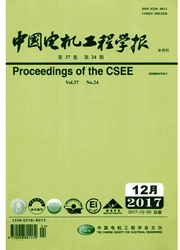

 中文摘要:
中文摘要:
并网逆变器是分布式发电系统的重要接口,入网电流的质量是其重要指标。采用LCL滤波器的并网逆变器可大幅抑制开关频率谐波,但滤波器谐振易造成入网电流振荡而控制困难。而且,随着分布式发电系统规模的增大,公共耦合点处的电网阻抗、电压波动与谐波以及串并联谐振等也会严重影响电流控制性能。已有较多文献针对分布式发电系统中的LCL滤波并网逆变器进行了研究,但仍欠缺对相关研究成果的系统性归纳与总结,难以明晰进一步研究的重点。该文从LCL滤波器参数优化设计、LCL谐振抑制、电流控制以及复杂电网下的谐波干扰等方面归纳并评述了已有的研究成果,指出了LCL滤波并网逆变器为适应大规模分布式发电所必须解决的关键技术问题。
 英文摘要:
英文摘要:
Grid-connected inverter is the key interface in distributed power generation systems. Its current quality is an important indicator. With LCL filters, switching harmonics are highly attenuated. However, the current is easily resonated by the LCL-filter resonance. With the increase of the proportion of distributed power generations, the grid impedance, voltage dip and harmonics, series and parallel resonances at the point of common coupling also affect the control performance. Many related studies were revealed, but the systematical summary of the existing work has not been seen yet so that the focus of the future work is unclear. This paper aims to review the relevant research work in the following aspects: optimization design of LCL filter, resonance damping strategy, current tracking control and harmonic interference under complex grid conditions. The key techniques for LCL-filtered grid-connected inverters in large-scale distributed power generations are given.
 同期刊论文项目
同期刊论文项目
 同项目期刊论文
同项目期刊论文
 期刊信息
期刊信息
